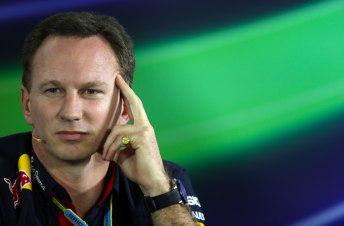

Red Bull boss Christian Horner has slammed the FIA’s fuel flow sensors following the decision to exclude Daniel Ricciardo from the Australian Grand Prix, labelling them as “immature technology”.
An alleged faulty fuel sensor is at the heart of an appeal by the world champion team after their driver Ricciardo was disqualified from a second place finish.
Horner is adamant his team has complied with rules regarding fuel flow and claims a discrepancy with the sensor is to blame for the reading that showed car #3 “consistently exceeding” the 100kg/h limit.
“I think its common knowledge there has been problems with the sensors all year,” Horner told media outside the Red Bull garage after confirming that the team will appeal.
“There are other teams who have had them fail. It’s immature technology and it is impossible to rely 100 per cent on that sensor which has proved to be problematic in almost every session we have run it.”
The team were required to replace the sensor on Ricciardo’s car on Friday after it failed during practice. It was replaced by another on Saturday which subsequently failed during qualifying.
Horner says the team were instructed to put the sensor used on Friday back into the car and apply an offset for the race.
However, he believes the readings did not correlate to those being emitted by other calculations provided by the team’s own equipment.
“That offset we didn’t feel was correct because into the race we could see a significant discrepancy between what the sensor was reading and our fuel flow reading,” he said.
“We had a fuel flow sensor that was fitted to the car that we believe to be in error…. We have been simply referring to that. Thats when there is a difference.”
Horner also stated that the team informed the sport’s governing body, the FIA, of its displeasure with the sensor and applied offset during the race, stating they would rely on the team’s own calculations in a bid to remain competitive.
In response, the FIA informed the team to turn down the fuel flow rate on Ricciardo’s car, but the request was ignored.
“They (FIA) informed us and we informed them we had serious concerns over their sensor,” added Horner.
“We believed on our reading otherwise we were in a situation where your reducing significant amount of power in the engine where we believed we fully complied with the regulations.
“If you end up in that situation depending on the calibrating of the sensor it will dictate who is going to be competitive or not.”
CLICK HERE for the FIA’s full reasoning behind the decision




















